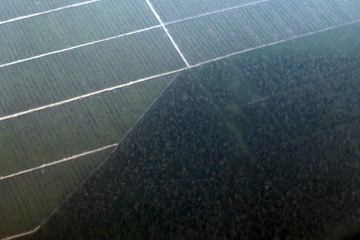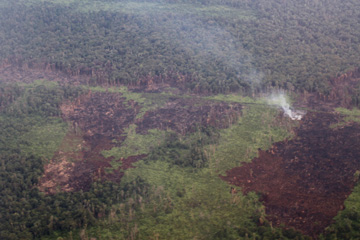An Indonesia palm oil company has relinquished part of its plantation concession to communities that traditionally use the land as part of its commitment to sustainability principles under the Roundtable on Sustainable Palm Oil (RSPO), reports the Forest Peoples Programme. The move is a response to a new procedure that could reduce conflict between palm oil developers and forest-dependent communities.
The company PT Agro Wiratama, a subsidiary of the Musim Mas group, will give 1,000 hectares of its 9,000 hectare concession in West Kalimantan (Indonesian Borneo) back to the community. The decision is a direct result of Agro Wiratama’s RSPO membership, which now requires member companies to publicly announce plans to expand their operations. The requirement aims to give civil society organizations and local communities an opportunity to lodge complaints and negotiate with developers before new operations begin. Until now, palm oil expansion has at times resulted in social conflict between traditional forest users — often indigenous people and small-scale farmers — and companies granted concessions by the government (most forest land is state-owned in Indonesia, independently of who actually uses it).
 Palm oil is now found in up to half of packaged processed foods, including Girl Scout cookies. By virtue of its high yield, palm oil is a cheaper substitute than other vegetable oils. In an effort to reduce costs, some candy makers are using palm oil in place of cocoa butter in their milk chocolate products. Photo by Rhett A. Butler |
“In the context of a pattern of development whereby millions of hectares of large-scale oil palm plantations have been established without consent on indigenous peoples’ land, this is a breakthrough,” said Marcus Colchester, Director of Forest Peoples Programme, in a statement. “We spotted PT Agro Wiratama’s plans to open up this area on the RSPO website and were able to alert our partners in Borneo.”
Forest Peoples Programme says that in this case, Gemawan, a local Indonesian NGO, alerted local people about the company’s plans, enabling them to negotiate with the local government, the company and the RSPO. The butapi, or regency head, recently signed off on the deal, making it official. The community was informed of the details last week.
“Our community has been trying very hard for so long to refuse admittance to palm oil plantation developers in our village,” said Azim Kitung, the Head of Mekar Jaya Village.
“We are very pleased that our land is secure now, because we’ve now got a chance to make choices about our lives. We now ask all the other parties involved in this decision to respect our choice,” added Kamarudin, one of the community leaders of the Kuayan community.
Forest Peoples Programme, together with Gemawan, note that Agro Wiratama’s decision has implications for other palm oil companies operating in Sambas Regency: 17 of them are members of RSPO.
  Conversion of forest and peatlands for oil palm plantations in West Kalimantan. Photo taken by Rhett A. Butle in March 2011. |
“We urge RSPO to apply the same procedures to these companies,” said Forest Peoples Programme in a statement. “Under the RSPO’s standards, companies are required to respect the customary rights of local communities and indigenous peoples and must not take over their lands without their ‘free, prior and informed consent’. Unfortunately, Indonesian laws and land administration do not recognize most communities’ land rights, so permits are routinely handed out to companies even though they overlap areas basic to peoples’ livelihoods and important for biodiversity.”
More than 3,000 land conflicts between palm oil developers and local communities in Indonesia have been registered with the country’s National Land Agency.
“What is needed is a reform of the laws so peoples’ land rights are recognized and secured,” said Norman Jiwan of SawitWatch, an Indonesian palm oil watchdog. “In the meantime we are relying on voluntary standards to try to get peoples’ basic rights respected, but the State should comply with international human rights norms rather than leave every situation to be argued out on a case by case basis. In this case Musim Mas has acted responsibly, once the concerns were raised, but unfortunately not all companies are so inclined.”
With more than 8 million hectares of oil palm plantations, Indonesia accounts for more than 40 percent of global palm oil production. But expansion has had a high environmental cost: millions of hectares of forest and peatland have been cleared in the name of palm oil production. Environmentalists say palm oil is one of the biggest threats to biodiversity in Southeast Asia.
In response to these concerns, in 2004 a group of stakeholders came together to establish the RSPO, which set criteria that aim to reduce the social and environmental impact of palm oil. The first shipments of certified sustainable palm oil went out in 2008 and the RSPO label is expected to soon appear on food packaging to assure customers that palm oil ingredients have been sourced in a responsible manner.
Related articles
Coalition calls on Europe to label palm oil on food products
(03/15/2011) Do you have the right to know whether the chocolate bar you’re munching on includes palm oil, which is blamed for vast deforestation in Malaysia and Indonesia? How about that frozen pizza? According to a coalition of environmental and conservation groups it’s time for food manufacturers to add palm oil to the label in Europe, instead of currently being listed as simply, and erroneously (palm kernels are fruits), ‘vegetable oil’.
First large-scale map of oil palm plantations reveals big environmental toll

(03/07/2011) Expansion of industrial oil palm plantations across Malaysia and Indonesia have laid waste to vast areas of forest and peatlands, exacerbating greenhouse gas emissions and putting biodiversity at risk, reports a new satellite-based analysis that maps mature oil palm estates across Peninsular Malaysia, Borneo, and Sumatra.
Breakthrough? Controversial palm oil company signs rainforest pact

(02/09/2011) One of the world’s highest profile and most controversial palm oil companies, Golden Agri-Resources Limited (GAR), has signed an agreement committing it to protect tropical forests and peatlands in Indonesia. The deal—signed with The Forest Trust, an environmental group that works with companies to improve their supply chains—could have significant ramifications for how palm oil is produced in the country, which is the world’s largest producer of palm oil.
Indonesian climate official: palm oil lobbyist is misleading the public
(12/29/2010) Alan Oxley, a lobbyist for industrial forestry companies in the palm oil and pulp and paper sectors, is deliberately misleading the public on deforestation and associated greenhouse gas emissions, said a top Indonesian climate official.
Lack of price premium for certified palm oil endangers sustainability initiative
(12/19/2010) The palm oil industry’s sustainability initiative is making considerable progress toward improving its environmental performance, but needs to do more to accelerate the adoption of responsible practices, argue researchers writing in mongabay.com’s open access journal Tropical Conservation Science.
U.S. companies should help drive push toward sustainable palm oil
(11/09/2010) U.S. companies should take a leadership role in helping ensure that palm oil production is sustainable and does not come at the cost of forests, climate, and communities, argues a new report published ahead of the annual meeting of the Roundtable on Sustainable Palm Oil (RSPO). The report, published by the National Wildlife Federation (NWF), says that while the U.S. is only a minor consumer of palm oil, its demand for the vegetable oil is fast rising, increasing four-fold since 2006. Palm oil, which is among the cheapest of vegetables owing to its high yield, is now found in up to 50 percent of packaged retail food products.
Misleading claims from a palm oil lobbyist
(10/23/2010) In an editorial published October 9th in the New Straits Times (“Why does World Bank hate palm oil?”), Alan Oxley, a former Australian diplomat who now serves as a lobbyist for logging and plantation companies, makes erroneous claims in his case against the World Bank and the International Finance Corp (IFC) for establishing stronger social and environmental criteria for lending to palm oil companies. It is important to put Mr. Oxley’s editorial in the context of his broader efforts to reduce protections for rural communities and the environment.
Consumers should help pay the bill for ‘greener’ palm oil

(01/12/2010) Palm oil is one of the world’s most traded and versatile agricultural commodities. It can be used as edible vegetable oil, industrial lubricant, raw material in cosmetic and skincare products and feedstock for biofuel production. Growing global demand for palm oil and the ensuing cropland expansion has been blamed for a wide range of environmental ills, including tropical deforestation, peatland degradation, biodiversity loss and CO2 emissions. In response to these concerns, a group of stakeholders—including activists, investors, producers and retailers—formed the Roundtable on Sustainable Palm Oil (RSPO) to develop a certification scheme for palm oil produced through environmentally- and socially-responsible ways. It is widely anticipated that the creation of a premium market for RSPO-certified sustainable palm oil (CSPO) would incentivize palm oil producers to improve their management practices.